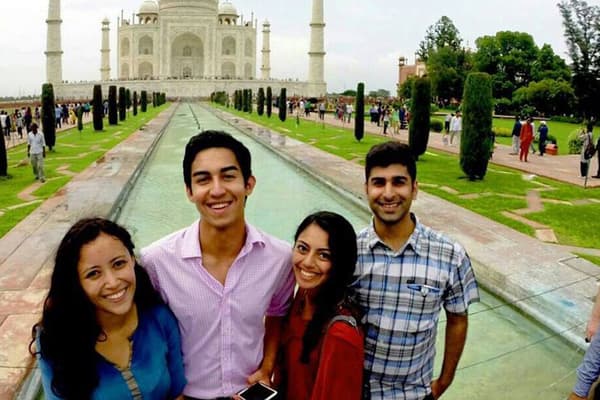
Yasin (second from right) with CLS classmates on a cultural excursion to the Taj Mahal in Agra.
By Yasin Khan (CLS Urdu 2014)
As a first generation American, I was intimately aware of Indian cultural practice growing up. Although I heard Urdu at home, my father was dedicated to the idea that I should speak English without an accent. He wanted to shield me from the hardship he faced as an immigrant. I felt the impact of my father’s decision when I first traveled to India in 2009 and was unable to communicate with family members who I was meeting for the first time.
For the past seven years my academic and professional experience has focused on promoting public health. While I was in India, I was surprised by how often people talked about the occurrence of domestic violence without ever addressing structural causes or solutions. My experiences in India reinforced my desire to become fluent in Urdu. Participating in the Critical Language Scholarship (CLS) Program was the perfect way to embark on my journey. I completed my Master's in Public Health just days before I started the CLS Program. At the time I thought it would be a great way to learn Urdu, and then come back to the states and continue working as public health researcher.
As soon as my Urdu classes started I realized two months would not be enough time for me to learn Urdu as well as I wanted to. I considered living in India, which was not something I had ever envisioned for myself as an option. Through conversations with the CLS cohort I found out about other opportunities for Americans to study Urdu, which led me to the American Institute of Indian Studies (AIIS) Urdu Fellowship, a year-long intensive language program housed in the same institute that runs the CLS Urdu Program.
When I started CLS I spoke only English and had never lived abroad. At first, everything was overwhelming, even the most basic things like crossing the street and asking what time dinner was. By the end of the program I had conquered many of the challenges in my daily life and could focus more on what people around me were struggling with. Through my experiences in India I have become intimately aware of everyday public health issues that plague Indians’ lives, like access to clean water and respiratory problems resulting from pollution.
Living with the realities of economic hardship and seeing its direct connection to child labor and unsafe work conditions has reinforced my passion for improving public health conditions in India. Without CLS, I would not have the language ability to understand how communities are attempting to deal with these issues and what their priorities were. When healthcare professionals have cultural and linguistic competence, they are better equipped to help their patients. Without spending the time to learn Urdu, I would be at a significant disadvantage working with communities to improve their health and well-being.
Since my time on CLS, I have participated on both the AIIS Urdu Fellowship program and the AIF Clinton Fellowship Program to continue learning Urdu and about issues relating to India. The AIF Clinton Fellowship has been a great opportunity for me to integrate my academic background, advocacy work, and language skills to find solutions to the complex health issues that arise from structural inequality. Now I have the opportunity to combine my language skills with my professional skills to give back to a community.
Tips to improve your language:
- Find something you enjoy about language learning and stick with that. I love Bollywood movies so watching them never feels like work, but it was a great way to learn new vocabulary in context and significantly improve my listening comprehension. If you like politics, watch the news in your target language. Knowing the general context of a political situation will help you fill in the language blanks. Music is another great option, especially if you can read along to the lyrics online.
- Incorporate your target language into your daily life. For example, you can follow a news site in your target language on Facebook. You can do the same with Instagram or by subscribing to list-servs. This way you don’t have to seek out opportunities for language practice – they just become a part of your daily life. Connect with other alumni! They are an incredible support and resource. Text them in your target language, share resources and watch movies in your target language together. You have shared experiences and interests so take advantage of them!

